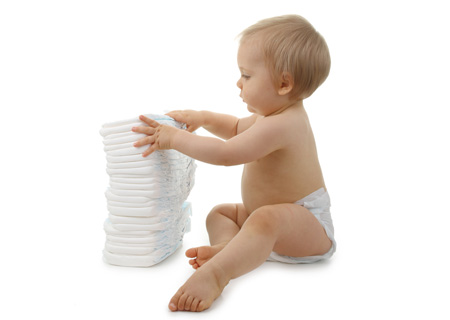New moms always tend to watch their infants poop to make sure they're getting enough to eat and digesting properly. Most baby poop has a sweet smell; sometimes it can have an acid or vinegar type smell. If baby poop smells like vinegar, it may be something as simple as a sensitivity to something a breastfeeding mother has eaten or a formula intolerance in bottle-fed infants. In rare cases, foul smelling poop could signal a serious health concern in baby.

Why does Your Baby's Poop Smell Like Vinegar?
First, a baby poop primer. Baby poop is usually a sign of what baby has eaten. New babies who only have breast milk have sweet smelling, yellow seedy poop. Bottle fed babies tend to have more solid stools that may even smell like real poop. The one thing that isn't normal, is when a new baby has poop that smells sour or stinks up the whole house. Baby poop doesn't develop any real odor until they have started solid foods. If baby poop smells like vinegar, here are a few of the causes:
1. Food Allergies
Food allergies or formula intolerance can show up in baby's stools. You may notice changes like vinegar or sour smell, mucus in the stool, or even small traces of blood. Food allergies cause stools to smell funny because they irritate the delicate lining of baby's digestive tract.
2. Intolerance to Lactose
Lactose is a type of sugar in milk and dairy products. If you are feeding a milk based formula or drinking milk while breastfeeding, your baby may have sour smelling stools. Lactose intolerance can also cause babies to have several loose stools per day.
3. Food Sensitivities
Food sensitivities aren't necessarily an allergy, but certain foods can be hard for baby to digest. They can also irritate the digestive tract and cause baby to have poop that smells like vinegar and changes in how their poop looks. The common offenders tend to be gluten from wheat, eggs, nut based products, and feeding dairy too soon.
4. Malabsorption
If baby poop smells like vinegar, it could be food and nutrients that were never absorbed into the bloodstream through the stomach or intestinal walls. Un-absorbed foods can sour in the digestive tract and cause poop to smell sour. The causes of malabsorption can range from viruses, to parasites, to a genetic malabsorption syndrome.
5. Crohn's Disease
Crohn's disease can happen to small children and babies, although it's hard to diagnose early on in infants. The condition causes the bowels to become inflamed and swollen. Researchers still haven't found a cause for Crohn's, but believe it to be both genetic and autoimmune. When the intestines become inflamed, they can't digest food properly and stools may smell sour or like vinegar.
6. Cystic Fibrosis
Cystic fibrosis or known as CF is a genetic condition that affects the quality and amount of mucus in the body. It can be fatal if it isn't managed properly and there isn't a cure. Babies and children with CF have problems digesting foods due to the pancreatic insufficiency. The mucus and fluids in the digestive tract become too thick and the intestines cannot absorb nutrients. CF patients have fatty stools that tend to be light and they can have a very foul odor.
Should You Worry?
When baby poop smells bad, it may be temporary and harmless. If this only happens on occasion it's probably temporary. However, if you notice this happening several times a day or over days to weeks you should probably get things checked out. Even one or two episodes of stinky loose stools are okay. It's when diarrhea continues and has an odor that you want to make sure your baby isn't dehydrated. Symptoms that should alert you to get your baby to the doctor include:
- Fever
- Extreme fussiness
- Irritable
- Abdominal pain (Drawing knees up when crying)
- Vomiting
- 6 loose stools in six hours or 10 loose stools in 24 hours
If you notice the above with sour smelling poop, contact your baby's doctor right away. If your baby is less than 3 months, go to the emergency room right away.
Common Treatments to Help
- Electrolyte Solution - With your doctor's permission, sometimes giving an electrolyte solution can help flush out any offending substances. Never give water to a baby and make sure you call your doctor first.
- Formula Challenge - If baby poop smells like vinegar and it's due to a formula intolerance, your doctor may have you do a formula challenge. This is usually done under close medical supervision. The doctor may even do this in the hospital. It requires giving electrolyte solution over a 24 hour period and then slowly adding back in formula to see if the symptoms come back. If they do, you will most likely switch to a new formula.
- Breastfeeding Challenge Diet - This requires removing any offending foods from your own diet and slowly adding them back in one at a time to find the culprit.
- Treat Infections Promptly - This means giving antibiotics to treat infections in the bowel. Viral infections need supportive treatment and have to run their course. Supportive treatment includes the BRAT diet (Bananas, Rice, Applesauce, Toast), electrolyte solutions, and rest.
- Supplementation for Malabsorption - If your baby has a malabsorption syndrome, doctors can give supplementation to help this condition. Things like digestive enzyme supplements, special formula, and vitamin supplements can help this condition and ease the odor.
How to Prevent It
- Give things time to calm down. (Your baby may be adjusting to new foods)
- Make some diet changes if breastfeeding (Fruit can cause sour smell, dairy/lactose.)
- Change Formula (discuss with doctor)
- Ask about giving probiotics
- Feed small amounts more often to help absorption
- When starting baby on solids, give each new food 3 to 5 days
- Do not give baby whole milk products before one-year of age
